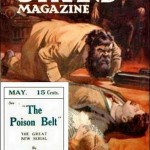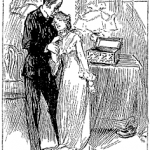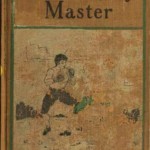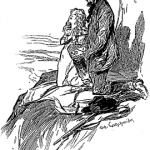“Consider the fiddlesticks!” the student cried angrily. “Am I to be paid always thus? Did I not stand two hours upon a glass insulator while you poured electricity into my body? Have you not stimulated my phrenic nerves, besides ruining my digestion with a galvanic current round my stomach? Four-and-thirty times you have mesmerised me, and what have I got from all this? Nothing. And now you wish to take my soul out, as you would take the works from a watch. It is more than flesh and blood can stand.”
“Dear, dear!” the Professor cried in great distress. “That is very true, Fritz. I never thought of it before. If you can but suggest how I can compensate you, you will find me ready and willing.”
“Then listen,” said Fritz solemnly. “If you will pledge your word that after this experiment I may have the hand of your daughter, then I am willing to assist you; but if not, I shall have nothing to do with it. These are my only terms.”
“And what would my daughter say to this?” the Professor exclaimed, after a pause of astonishment.
“Elise would welcome it,” the young man replied. “We have loved each other long.”
“Then she shall be yours,” the physiologist said with decision, “for you are a good-hearted young man, and one of the best neurotic subjects that I have ever known — that is when you are not under the influence of alcohol. My experiment is to be performed upon the fourth of next month. You will attend at the physiological laboratory at twelve o’clock. It will be a great occasion, Fritz. Von Gruben is coming from Jena, and Hinterstein from Basle. The chief men of science of all South Germany will be there.
“I shall be punctual,” the student said briefly; and so the two parted. The Professor plodded homeward, thinking of the great coming event, while the young man staggered along after his noisy companions, with his mind full of the blue-eyed Elise, and of the bargain which he had concluded with her father.
The Professor did not exaggerate when he spoke of the widespread interest excited by his novel psychophysiological experiment. Long before the hour had arrived the room was filled by a galaxy of talent. Besides the celebrities whom he had mentioned, there had come from London the great Professor Lurcher, who had just established his reputation by a remarkable treatise upon cerebral centres. Several great lights of the Spiritualistic body had also come a long distance to be present, as had a Swedenborgian minister, who considered that the proceedings might throw some light upon the doctrines of the Rosy Cross.
There was considerable applause from this eminent assembly upon the appearance of Professor von Baumgarten and his subject upon the platform. The lecturer, in a few well-chosen words, explained what his views were, and how he proposed to test them. “I hold,” he said, “that when a person is under the influence of mesmerism, his spirit is for the time released from his body, and I challenge any one to put forward any other hypothesis which will account for the fact of clairvoyance. I therefore hope that upon mesmerising my young friend here, and then putting myself into a trance, our spirits may be able to commune together, though our bodies lie still and inert. After a time nature will resume her sway, our spirits will return into our respective bodies, and all will be as before. With your kind permission, we shall now proceed to attempt the experiment.”
The applause was renewed at this speech, and the audience settled down in expectant silence. With a few rapid passes the Professor mesmerised the young man, who sank back in his chair, pale and rigid. He then took a bright globe of glass from his pocket, and by concentrating his gaze upon it and making a strong mental effort, he succeeded in throwing himself into the same condition. It was a strange and impressive sight to see the old man and the young sitting together in the same cataleptic condition. Whither, then, had their souls fled? That was the question which presented itself to each and every one of the spectators.
Five minutes passed, and then ten, and then fifteen, and then fifteen more, while the Professor and his pupil sat stiff and stark upon the platform. During that time not a sound was heard from the assembled savants, but every eye was bent upon the two pale faces, in search of the first signs of returning consciousness. Nearly an hour had elapsed before the patient watchers were rewarded. A faint flush came back to the cheeks of Professor von Baumgarten. The soul was coming back once more to its earthly tenement. Suddenly he stretched out his long thin arms, as one awaking from sleep, and rubbing his eyes, stood up from his chair and gazed about him as though he hardly realised where he was. “Tausend Teufel!” he exclaimed, rapping out a tremendous South German oath, to the great astonishment of his audience and to the disgust of the Swedenborgian. “Where the Henker am I then, and what in thunder has occurred? Oh yes, I remember now. One of these nonsensical mesmeric experiments. There is no result this time, for I remember nothing at all since I became unconscious; so you have had all your long journeys for nothing, my learned friends, and a very good joke too; “at which the Regius Professor of Physiology burst into a roar of laughter and slapped his thigh in a highly indecorous fashion. The audience were so enraged at this unseemly behaviour on the part of their host, that there might have been a considerable disturbance, had it not been for the judicious interference of young Fritz von Hartmann, who had now recovered from his lethargy. Stepping to the front of the platform, the young man apologised for the conduct of his companion. “I am sorry to say,” he said, “that he is a harum-scarum sort of fellow, although he appeared so grave at the commencement of this experiment. He is still suffering from mesmeric reaction, and is hardly accountable for his words. As to the experiment itself, I do not consider it to be a failure. It is very possible that our spirits may have been communing in space during this hour; but, unfortunately, our gross bodily memory is distinct from our spirit, and we cannot recall what has occurred. My energies shall now be devoted to devising some means by which spirits may be able to recollect what occurs to them in their free state, and I trust that when I have worked this out, I may have the pleasure of meeting you all once again in this hall, and demonstrating to you the result.” This address, coming from so young a student, caused considerable astonishment among the audience, and some were inclined to be offended, thinking that he assumed rather too much importance. The majority, however, looked upon him as a young man of great promise, and many comparisons were made as they left the hall between his dignified conduct and the levity of his professor, who during the above remarks was laughing heartily in a corner, by no means abashed at the failure of the experiment.
Now although all these learned men were filing out of the lecture-room under the impression that they had seen nothing of note, as a matter of fact one of the most wonderful things in the whole history of the world had just occurred before their very eyes Professor von Baumgarten had been so far correct in his theory that both his spirit and that of his pupil had been for a time absent from his body. But here a strange and unforeseen complication had occurred. In their return the spirit of Fritz von Hartmann had entered into the body of Alexis von Baumgarten, and that of Alexis von Baumgarten had taken up its abode in the frame of Fritz von Hartmann. Hence the slang and scurrility which issued from the lips of the serious Professor, and hence also the weighty words and grave statements which fell from the careless student. It was an unprecedented event, yet no one knew of it, least of all those whom it concerned.
The body of the Professor, feeling conscious suddenly of a great dryness about the back of the throat, sallied out into the street, still chuckling to himself over the result of the experiment, for the soul of Fritz within was reckless at the thought of the bride whom he had won so easily. His first impulse was to go up to the house and see her, but on second thoughts he came to the conclusion that it would be best to stay away until Madame Baumgarten should be informed by her husband of the agreement which had been made. He therefore made his way down to the Graner Mann, which was one of the favourite trysting-places of the wilder students, and ran, boisterously waving his cane in the air, into the little parlour, where sat Spiegler and Muller and half a dozen other boon companions.
“Ha, ha! my boys,” he shouted. “I knew I should find you here. Drink up, every one of you, and call for what you like, for I’m going to stand treat to-day.”
Had the green man who is depicted upon the signpost of that well-known inn suddenly marched into the room and called for a bottle of wine, the students could not have been more amazed than they were by this unexpected entry of their revered professor. They were so astonished that for a minute or two they glared at him in utter bewilderment without being able to make any reply to his hearty invitation.
“Donner und Blitzen!” shouted the Professor angrily. “What the deuce is the matter with you, then? You sit there like a set of stuck pigs staring at me. What is it, then?”
“It is the unexpected honour,” stammered Spiegel, who was in the chair.
“Honour — rubbish!” said the Professor testily. “Do you think that just because I happen to have been exhibiting mesmerism to a parcel of old fossils, I am therefore too proud to associate with dear old friends like you? Come out of that chair, Spiegel my boy, for I shall preside now. Beer, or wine, or shnapps, my lads — call for what you like, and put it all down to me.”
Never was there such an afternoon in the Gruner Mann. The foaming flagons of lager and the green-necked bottles of Rhenish circulated merrily. By degrees the students lost their shyness in the presence of their Professor. As for him, he shouted, he sang, he roared, he balanced a long tobacco-pipe upon his nose, and offered to run a hundred yards against any member of the company. The Kellner and the barmaid whispered to each other outside the door their astonishment at such proceedings on the part of a Regius Professor of the ancient university of Kleinplatz. They had still more to whisper about afterwards, for the learned man cracked the Kellner’s crown, and kissed the barmaid behind the kitchen door.






